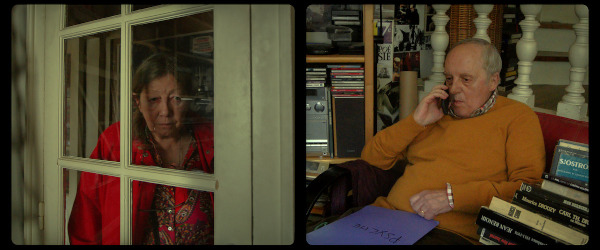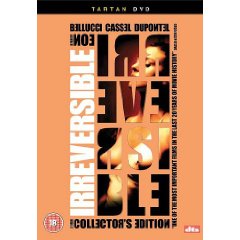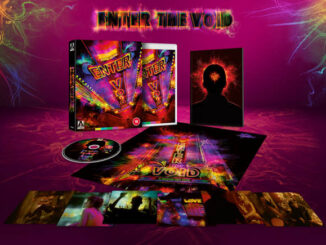Vortex (2022)
Directed by: Gaspar Noé
Written by: Gaspar Noé
Starring: Dario Argento, Françoise Lebrun

Vortex (2022)
Directed b Gasper Noe
“To all those whose brains will decompose before their hearts” – a poetic title card which opens Gasper Noe’s latest film: Vortex. Anyone familiar with Noe’s previous work and his antics therein might be surprised to see how much left turn the director has taken with his latest. Having seemingly swapped the psychedelic for the sombre, he’s going from the drug fuelled descent into a dancehall hell of his previous feature Climax, to a portrait of a married couple watching their decline and staring death in the face.
Vortex follows the couple, played by Françoise Lebrun and Dario Argento (yes that one), only ever known as “the mother” and “the father” – their day-to-day life is a passive and slow one. The father is a writer, trying to put together a book on cinema and its relation to dreams. The mother is a retired psychiatrist. As the film progresses, slowly it is revealed that the health of the two is in serious decline. The father has an ongoing heart condition but manages to continue a normal life. The mother has developing dementia, it isn’t clear when this started, but that’s perhaps the point. Her husband picks her up and sets her back on course as they continue their separate lives.
The immediate point of interest for the audience is going to be the presentation. The film is entirely shot using a split screen, and with this to shockingly great effect. The couple wake up in bed and we see two boxes surrounding them. Your normal rectangular cinema screen is now two squares. She gets up to go make the coffee, while he continues to sleep. Knowing about this going in I’d assumed this would be disorientating, but it’s quite the opposite. While in theory you’re watching two perspectives of equal importance running in parallel, there’s clearly a main focal point at any one time. Sometimes one story will slow down, performing some mundane action, which lets it breathe and you can pay attention to the other. After a while your eyes will just gaze from one side of the screen to the other, and it becomes effortless. Anyone who may have seen Noe’s previous short film (Lux Æterna ) will have already experienced this to some degree. Also shot in split screen, it really feels as though it was a dry run for Vortex in more ways than one. But he still builds on this, from a technical perspective – interesting effects come from the split screen implementation; both halves can collide composing an almost normal shot, or use different angles on the same scene, and sometimes breaking through the space in-between.

Outside of the technical, I did take some issue with how much the split screen effect added to the narrative of the film. It’s at its best when it strictly follows the couple in their flat, and with this manages to create an unsuspecting emotive underscoring to the story that’s developing. There aren’t any strict rules to what is subject of each frame, but with the two, it creates this powerful effect of presence within this flat. If one leaves the room to go into the office you can feel the distance between the two, it puts you into this strange place of a 3rd person observer, and you can see the character’s reactions while the other cannot. At its worst it just looks cool. Understandably, despite the subject matter, the implementation makes it an incredibly stylised film, but there are several moments throughout where it feels unjustified. I’m not sure if this is a problem due to a commitment to the bit, or an issue with editing, but doesn’t add anything to the overall experience outside of a handful of very effective moments. I had problems with other stylistic choices for similar reasons. The film opens with a very long credit sequence shown in reverse – the first of many references to early cinema? Noe just being Noe? I’m not sure. This isn’t usually something I’d criticise, but with a director known for having the form influence the narrative, it irks me.
After a painfully slow introduction, the film really starts to come to its own in the second half when their son is introduced. The film makes no secret about the fact that death is approaching these characters, not only by their health, but going so far as to credit the actors in the opening listing their birth year and leaving their deaths blank. The son enters the picture in an attempt to look after his parents, while also struggling with troubles of his own. An addict seemingly in recovery, it’s not a far stretch to see our director in this character. Even more so when discovering the film’s inspiration came from his own mother’s dementia, and himself suffering a near fatal brain haemorrhage. The whole thing takes a very matter of fact approach to the subject of death. While partially there’s an attitude of “People get old, they die ”, it’s done with a slightly more optimistic flare. It acknowledges death as a part of life, and they’re not dead yet so still a life to lead. It also manages to raise questions over how one’s twilight years should be handled. Both in the personal, as well as the external: what is a family’s responsibility, and of whom lies the duty of care?
I really don’t know what I was expecting going into Vortex but left emotional and reflective. While I don’t think it’s utilised to the fullest effect, the split screen garners some wondrous and powerful results. With it, he’s created a brutally real, sympathetic, and humanistic depiction of an ageing couple’s deterioration. I’ll admit I struggled with the pacing (and I think most people will) I believe this at least partially by design – It’s not a spectacular like Noe’s other work but wouldn’t be appropriate if it was. As time passes from watching the movie, I think I’ve gained more of an appreciation for what it’s trying to do and how it’s handled. An earnest and straight-faced film by someone cinephiles would never have expected.






Be the first to comment